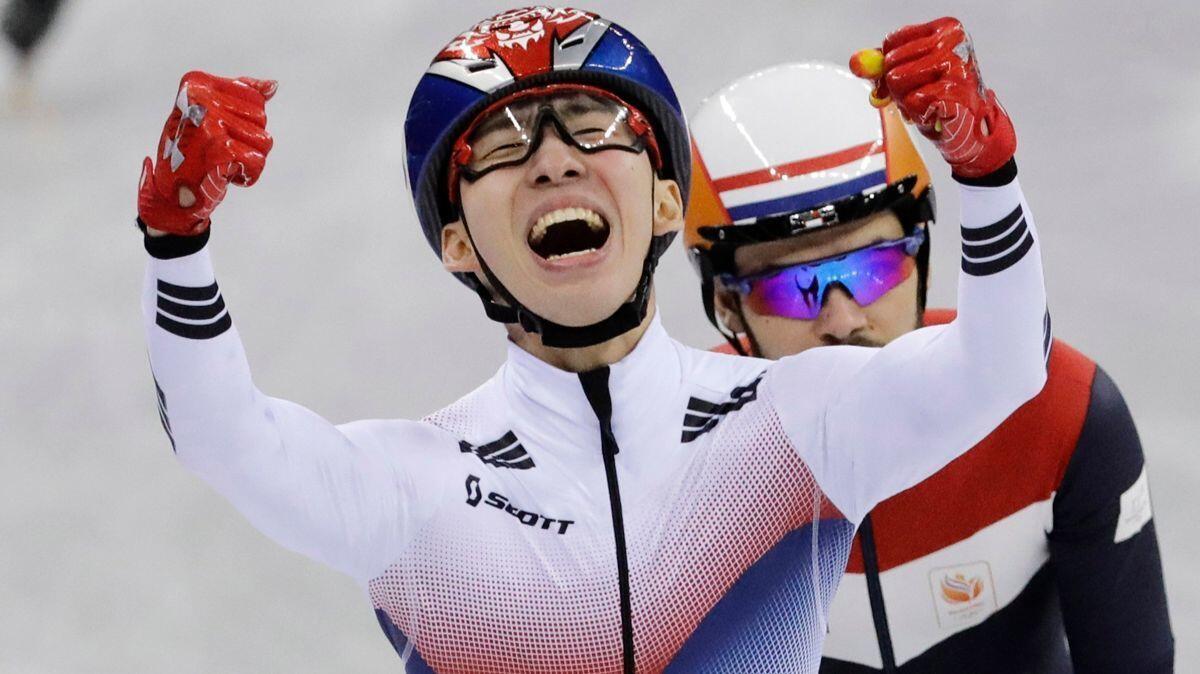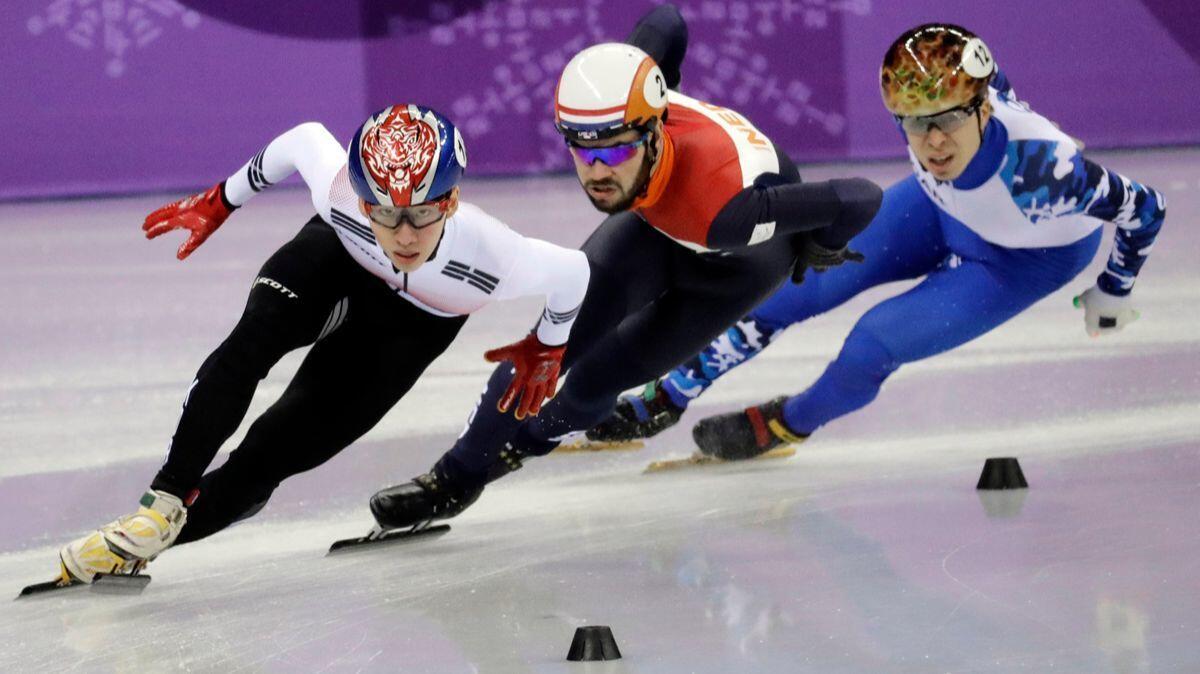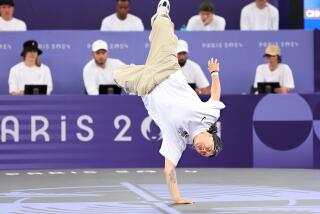Column: Raucous crowd celebrates South Korean gold in speedskating

Reporting from Pyeongchang, South Korea — The moment everything changed for Lim Hyojun is marked by a line inside of the Gangneung Ice Arena.
Whatever Lim accomplishes in the coming weeks, months, years and decades, his life will be divided in two distinct periods: Before he crossed that line Saturday night and after. By doing so, the 21-year-old short-track speedskater claimed the Olympic gold medal he dreamed of for the majority of his existence, the first medal of these Games for host country South Korea.
Korean flags were waved in the 12,000-seat arena. Lim extended forward a pair of clenched fists and screamed into the night. The home crowd screamed with him.
This was more than a sporting event. this was a patriotic celebration.
Short-track speedskating might be a niche sport in the United States, but it’s a national obsession in South Korea.
The sport produced the country’s first-ever Winter Olympics gold medalist, Ki-hoon Kim. He won the 1,000-meter competition at the Albertville Games in 1992, when short-track speedskating awarded medals for the first time.
Counting the latest addition by Lim, 22 of South Korea’s 27 gold medals in the Winter Olympics have been won in short track. South Korea’s domination of the sport is such that Da-Woon Sin, the reigning 1,500-meter world champion, failed to qualify for the country’s Olympic team.
That dominance is expected to continue in these Games. Experts predict that South Korea’s men and women would match their gold medal count from the two previous Olympics and win six in these Games, including four on short track.
The crowd reflected the country’s optimism. South Korean president Moon Jae-in made an appearance, with United States vice president Mike Pence by his side. Dynamic Duo, who at one time had the country’s highest selling hip-hop album, performed between events. The mere sight of a South Korean skater elicited frenzied responses from the fans, starting in the preliminary rounds of the 1,500 meters (in which Lim and fellow countryman Daeheon Hwang won their respective heats to advance to the final).
The athletes were also taken by the atmosphere, which was enhanced by a North Korean cheering section.

“It’s amazing to skate for 12,000 people in a small ice rink like this,” said the Netherlands’ Sjinkie Knegt, who won the silver medal. “I enjoyed it.”
The biggest cheers of the night didn’t come from the 1,500-meter, but rather, one of the heats of the women’s 3,000-meter relay. South Korea recovered from an early spill and staged a furious comeback to claim victory in the four-team race and advance to the final on Feb. 20.
As the event’s top-ranked skater in the world, Hwang, 18, entered the 1,500-meter final as the favorite. (Hwang’s opening-round race featured a North Korean, Un Song Choe, who was the last of the six skaters to complete the race.)
The public address announcer asked for silence as the nine competitors inched toward their starting positions. The crowd still made noise.
“Quiet, please!” the announcer said again.
Hwang and Lim were content to sit in the middle of pack for the first handful of turns around the track. On the sixth revolution, they made their moves and surged into the front.
The crowd erupted with cheers.
With a little more than 300 meters remaining, one of Hwang’s skates somehow grazed the mask of Frenchman Thibaut Fauconnet. Hwang and Fauconnet spun out and crashed into the purple pads covering the nearby wall. Neither finished the race.
As a shocked Hwang slowly skated along the wall, a jubilant Lim crossed the finish line, a step in front of Knegt.
Russian Semen Elistratov, who is competing under the Olympic flag because of his country’s drug-related ban from these Games, won the bronze in 2:10.687.
The party was on.
Well, not for Hwang, who was consoled by his coaches. Lim was also embraced by his coaches over the wall, but in celebration. He was now a national hero.
A former world youth champion, Lim has largely failed to realize his promise at the senior level because of countless injuries.
“There were times I wanted to give up,” he said through an interpreter. “But my target was clear: Pyeongchang 2018. That’s why I was able to overcome any difficulties.”
Lim envisioned this day from the time he was nine years old, when he watched Viktor Ahn of South Korea win an unprecedented four medals, three gold and one bronze at the Turin Games of 2006.
“That’s when I started dreaming,” Lim said.
Follow Dylan Hernandez on Twitter @dylanohernandez
More to Read
Go beyond the scoreboard
Get the latest on L.A.'s teams in the daily Sports Report newsletter.
You may occasionally receive promotional content from the Los Angeles Times.










